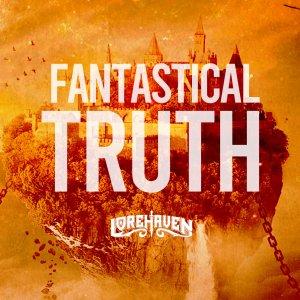Fantastical Truth

132. Do Christians Really Need Horror? | Fiction’s Chief End, part 5
God reveals his truth to us through stories, especially the true stories and fictional parables in his word—and some of the stories he tells are scary. Horror is God’s idea, and he often uses this to prepare us for real-world monsters and dangers. Yet we’ve all seen or heard horror stories that are too disturbing. As a result, Christians often shun this genre. But how do darker stories help us flee toward the light of Christ?
Subscribe to Lorehavenarticles • news • library • reviews • podcast • gifts • guild
Episode sponsors Oasis Audio, The Rabbit Room Press Audio books: Henry and the Chalk Dragon, The Door on Half Bald Hill Mountain Brook Fire, Wraithwood by Alyssa Roat David Umstattd, The Pilgrim’s Progress ReloadedExplore the complete Podcast Sponsors page.
Concession stand- This rare episode continues both our Fiction’s Chief End and Monster Month series.
- Christians might not hold as “doctrine” a belief that horror is bad.
- More likely, we find this belief lurking in the shadows of our minds.
- But some Christian leaders have gone on record opposing horror.
“Horror is an example of a genre which was conceived in rebellion. It is based on a fascination with ungodly fear. It should not be imitated, propagated, or encouraged. It cannot be redeemed because it is presuppositionally at war with God.”
—one homeschooling leader (since fallen into his own shadow)
- Some horror is not redemptive, only terrifying people for terror’s own sake.
- Some horror is ridden with other idols. Some is torture porn. Some is truly demonic.
- That’s why some Christian novels are labeled supernatural, paranormal, or dark fairy tale.
- In the Lorehaven library, we group horror titles under the label supernatural and beyond.
- Christians will have different convictions and instincts about horror. Your conscience may vary.
- But horror is not an unredeemable genre (like porn.) Horror is part of our cultural landscape.
- We’re aware of the “fire and brimstone” preaching excesses and other church fear tactics.
- Yet, we believe not all scary stories or fear-based appeals are wrong. Some may be necessary.
- This is more true in a culture that has diluted themes about God’s wrath against sin.
- Like our other episodes in the Fiction’s Chief End series, we’re trying to approach this proactively.
- That is, we do not assume that horror/darkness is a Fix for a Problem.
- Some people, including Christians, can use these as ways to rile others.
- They act like stories are a tool to “get at” people, rather than glorify God.
- So we do ignore all those notions, asking how horror stories exalt Jesus.
- “Only terror will cause you to understand the message” (Isaiah 28:19, CSB).
- “The fear of God will be with you to keep you from sinning” (Exodus 20:20).
- “The fear of the Lord is the beginning of wisdom” (Proverbs 9:10).
- Jesus confirmed that we face good fears and bad fears (Luke 12:3–5).
- Fear itself is not the problem, but rather the object of our fears.
- It is natural and good to experience fear, but not all fears are healthy.
- Horror is the exploration of fear and the possible responses.
- Scary movies help personify our deepest fears and show that they can be overcome.
- This Present Darkness, The Oath, and beyond by Frank E. Peretti
- Lilith by George MacDonald
- Perelandra by C. S. Lewis
- Descent into Hell by Charles Williams
- The Great God Pan by Arthur Machen
Chapel of the Air!
David and Karen Mains?! Ohhhh! They had a couple of excellent fantasy allegory books with gorgeous illustrations. I grew up on those!
Mazer Rackham Jr. (Twitter) enjoyed our Beowulf/Hobbit articles:“What can the tales of my pagan ancestors have to do with Jerusalem?” Good piece here.
Teddi Deppner (Havok) enjoyed episode 131 with Morgan L. Busse:I enjoyed Morgan’s books so much! I bought the audiobook AND the Kindle version and would listen on my commute and then read at night. First time I’ve ever done that, but it was a great way to absorb a book in my spare moments.
Meanwhile at Lorehaven- Read our series Behold God’s Providence in Beowulf and The Hobbit.
- This week we should have a new E. Stephen Burnett article about Dracula.
- And of course, we’ve started our Dracula book quest in the Guild.
- Subscribe free and get your exclusive invitation to the Lorehaven Guild.
Speaking of Dracula, as we start this book quest, we plan to peer deeper into this crypt. This year, thousands of new readers have discovered Bram Stoker’s original classic novel that sees earnest and good heroes fighting this evil vampire’s predations. What have they thought about the story? How have they sought to respect the world they’re entering? And after many decades of showing Dracula as a cartoon or tragic figure, how can we better discern this villain and his horror versus the holiness of Christ’s power?






 Visit Podcast Website
Visit Podcast Website RSS Podcast Feed
RSS Podcast Feed Subscribe
Subscribe
 Add to MyCast
Add to MyCast